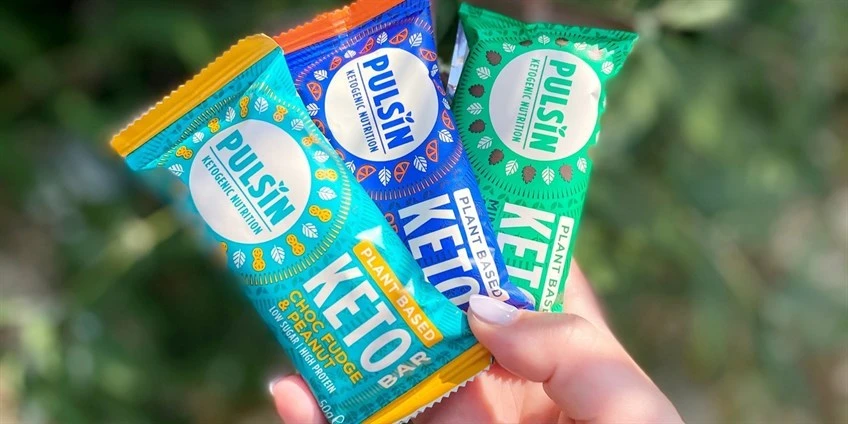You might have noticed people starting to talk about the keto diet recently. Maybe you’re thinking of trying it, or maybe you just want to understand what it is. Lucky for you we’re here to answer those questions and, if you want to give it a go, we can provide you with some delicious keto products to help you on your journey. So, let’s get to it.
Our exciting Keto range offers four fantastic products – three delicious protein snack bars and a Vanilla Protein Powder. All the products are low in sugar, making them ideal for those following a low carb or Keto diet. The product range also benefits from being plant based, gluten free and high in plant based protein making it a great option for a wide variety of different diets.
So, what is the Keto diet?
The Keto diet is a diet that consists primarily of fats, moderate protein and low carbs (usually under 50g per day). This doesn’t have to mean eating greasy bacon or cheese all day- it’s easy enough to choose a keto diet and be vegetarian or vegan too.
Usually, carbs are broken down into glucose that enters the bloodstream to be used for energy or it will be stored in the liver as glycogen. After a few weeks of a low-carb diet, this glycogen is released to be used for energy. Eventually, this energy store is depleted, and the body will use stored fat for energy instead- these fat cells are taken to the liver to be converted into ketones, used for fuel!
What are the benefits?
The keto diet can help reduce calorie consumption due to the satiating effect of fats and proteins compared to carbohydrates, resulting in a lower overall energy intake. There is also a lot of research into the keto diet and other medical issues, such as epilepsy, in which the diet can reduce seizures.
Following a keto diet can be safe for most people if it is well planned and all aspects of nutrition are considered. However, consuming some vitamins and minerals may be more difficult, so planning meals around this or taking supplements may be necessary. Our Vanilla Keto Powder has added vitamins B and C to help you reach your nutrition goals!
What can I eat on Keto?
There are lots of great keto foods out there- think avocados, nuts, seeds and coconut for your fat sources! Protein sources such as beans and lentils should be mostly avoided due to their carb content (unless this can fit within your 50g carbs daily).
For an extra protein boost, our keto bars are a great filling snack that is high in protein, fat, and fibre, low in carbs and sugar, and excellent after a workout! We all know how essential fruits and veggies are, so stick to leafy green vegetables and berries to get a good intake of vitamins and fibre without carbs or sugar.
| Yes on keto | No on keto |
| Nuts, nut butters and nut oils | Pasta, Rice or Bread |
| Seeds | Cereals and oats |
| Avocados | Potatoes |
| Olives | Sugary foods and drinks |
| Coconut (including coconut milk and oil) | High carb fruits such as bananas |
| Veggies such as broccoli, cabbage, cucumber, green beans, peppers, spinach, courgettes, mushrooms… | Sugars and sugary syrups |
| Berries | Beans, Pulses and Legumes |
Top Keto questions:
What is Ketosis?
Ketosis is the process of using ketones for energy rather than glucose. This process begins when the body is depleted of carbs and stored carbs (glycogen), which convert fat into ketones for fuel.
What are the benefits of a Keto diet?
There are many benefits to the keto diet- it can help with weight loss, feeling fuller and giving more energy. It can also benefit people with medical issues; there is a lot of research into the keto diet and epilepsy.
Does a Keto diet need intermittent fasting? / is intermittent fasting mixed with a Keto diet safe?
The keto diet and intermittent fasting are different things. A Keto diet limits food choices to reduce carbs, whereas IF will limit the time available to eat, although this can include carbs. It is possible to mix IF and keto, but we recommend speaking to a medical professional before changing to a restricted diet. It is essential to maintain a balanced diet within the restrictions of keto.
What do you eat and avoid on a Keto diet?
See table above for quick insight!
How many grams of protein should I eat on Keto?
The amount of protein you consume shouldn’t necessarily change when going on the keto diet. The average person needs between 45-55g of protein per day, slightly more recommended if you are particularly active.
How much fat and protein is on a Ketogenic diet?
Fat should make up around 70% of a keto dieter’s daily intake of calories, with 20% protein and 10% carbs- although some use 50g carbs per day as a primary marker.
Is a Ketogenic diet safe for type 2 diabetics?
The keto diet can benefit people with diabetes due to its reduced impact on blood sugar levels (fewer carbs available to spike blood sugar). However, speaking to a medical professional before following a keto diet is best.

